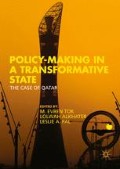Abstract
The question of national identity is raised when there is a need for redefinition, and now that Qatar is embracing a new era, the need becomes imperative. The current citizenship model was comparatively effective during the nation-building stage in creating legitimate national “communities” within the bigger, more established regional and national identities. However, a new historical era calls for a new form of citizenship that is inclusive and sustainable. Ultimately, investing in human capital is the way in which Qatar’s economy can be transformed into a knowledge-based one. The generosity of the state towards citizens and non-citizens is unquestionable; however, to ensure returns on investments, Qatar needs to retain a proportion of its graduates and workers across the different sectors according to a systematic, institutionalized citizenship law. The building of a strong citizenry with a unified national identity is to promote inclusiveness and pluralism, to eradicate discrimination within the existing citizenship model, and to embrace previously marginalized identities. A national identity should trump all other forms of sub-identity, especially tribal identity. All citizens should have a claim over their country, regardless of ethnicity, gender, or sectarian background. At the same time, it should be emphasized that a national identity is as fluid as the identities of its people, and that “[i]dentity isn’t given once and for all: it is built up and changes throughout a person’s lifetime” (Maaolouf, On Identity. London: Harvill, 2000: 20).
Access this chapter
Tax calculation will be finalised at checkout
Purchases are for personal use only
Bibliography. Qatar: Policy Making in a Transformative State
Al-Dosari, Fatima. 2014. No entry for Qatari women: The day I was banned from jazz. Doha, Qatar: Last Modified April 3, 2014. http://www.justhere.qa/2014/04/entry-qatari-women-day-banned-jazz/Just Here Qatar.
Al Khater, Abdulaziz Mohamed. 2014. Title. Abdazizbn Mohammed Al Khater: Citizen who carries the concerns of his homeland and nation, December 29, 2014. http://azizalkhater.blogspot.com/2014/12/blog-post_29.html
Al-Naama, Nasser. 2013. In Qatar, tentacles of tribalism hold back national aspirations. Just Here Qatar. Last Modified July 17, 2013. http://www.justhere.qa/2013/07/in-qatar-tentacles-of-tribalism-hold-back-national-aspirations/
Al-Nakib, Ranla. 2015. Education and Democratic Development in Kuwait: Citizens in Waiting. London: Last Modified March 1. http://www.chathamhouse.org/publication/education-and-democratic-development-kuwait-citizens-waiting Chatham House, the Royal Institute of International Affairs.
Babar, Zahra. 2014. The cost of belonging: Citizenship construction in the State of Qatar. Middle East Journal 68(3): 403–420.
Bloemraad, Irene, Anna Korteweg, and Gökçe Yurdakul. 2008. Citizenship and immigration: Multiculturalism, assimilation, and challenges to the nation-state. Sociology 34(1): 153–179.
Cooke, M. 2014. Tribal Modern: Branding New Nations in the Arab Gulf. Berkeley: University of California Press.
Crystal, Jill. 1995. Oil and Politics in the Gulf: Rulers and Merchants in Kuwait and Qatar, Rev. edn. Cambridge: Cambridge University Press.
Dervin, F. 2011. Cultural identity, representation and othering. In The Routledge Handbook of Language and Intercultural Communication, ed. Jane Jackson, 181–194. Abingdon, UK: Routledge.
Eriksen, T. 2005. Ethnicity and nationalism. In Nations and Nationalism: A Reader, eds. P. Spencer, and H. Wollman, 136–140. New Brunswick, N.J.: Rutgers University Press.
Exell, K., and T. Rico. 2013. ‘There is No Heritage in Qatar’: Orientalism, colonialism and other problematic histories. World Archaeology 45(4): 670–685.
General Secretariat for Development Planning (Qatar). 2008. Qatar National Vision 2030. Doha: Retrieved from http://www.gsdp.gov.qa/portal/page/portal/gsdp_en/knowledge_center/Tab/QNV2030_English_v2.pdfMinistry of Development Planning and Statistics (Qatar).
———. 2011. Qatar National Development Strategy 2011–2016: Towards Qatar National Vision 2030. Ministry of Development Planning and Statistics (Qatar): Retrieved from http://www.gsdp.gov.qa/gsdp_vision/docs/NDS_EN.pdfDoha.
Gharib, R.Y., and A.M. Salama. 2014. Nature of urban interventions in changing the old center of a globalizing Doha. Frontiers of Architectural Research 3(4): 468–476.
Graham, B. 2002. Heritage as knowledge: Capital or culture? Urban Studies 39(5–6): 1003–1017.
Hassan, I.K. 2015. Gulf-Gulf Conflicts: The Reasons, the Issues, and the Solution Mechanisms (in Arabic). Doha: Retrieved from http://studies.aljazeera.net/files/gccpath/2015/01/2015114125342702598.htmlAljazeera Center for Studies.
Jerkins, Gwynn. 2008. Contested Space: Cultural Heritage and Identity Reconstructions: Conservation Strategies within a Developing Asian City. Münster: LIT Verlag.
Kamrava, Mehran. 2013. Qatar: Small State, Big Politics. Ithaca, NY: Cornell University Press.
Kinninmont, J. 2013. Citizenship in the Gulf. In The Gulf States and Arab Uprisings, ed. A. Echagüe, 47–58. Madrid: FRIDE.
Maalouf, A. 2000. On Identity. London: Harvill.
Patrick, N. 2009. Nationalism in the Gulf States. London: LSE Centre for for the Study of Global Governance..
Swann, W.B. Jr., and J.K. Bosson. 2008. Identity negotiation: A theory of self and social interaction. In Handbook of Personality: Theory and Research, eds. O. John, R. Robins, and L. Pervin, 448–471. New York: Guilford Press.
Women’s Research and Studies Center. 2013. gẖyr ạlmwạṭn bdwl mjls ạltʿạwn ạlkẖlyjy: ḥqwq w ḥlwl [National Women married to Non-nationals in the GCC countries: Rights and Solutions], Kuwait, May 22.
Yuval-Davis, N. 1997. Women, citizenship and difference. Feminist Review 57(Autumn): 4–27.
Author information
Authors and Affiliations
Editor information
Editors and Affiliations
Copyright information
© 2016 The Author(s)
About this chapter
Cite this chapter
Al-Malki, A.M. (2016). Public Policy and Identity. In: Tok, M., Alkhater, L., Pal, L. (eds) Policy-Making in a Transformative State. Palgrave Macmillan, London. https://doi.org/10.1057/978-1-137-46639-6_9
Download citation
DOI: https://doi.org/10.1057/978-1-137-46639-6_9
Published:
Publisher Name: Palgrave Macmillan, London
Print ISBN: 978-1-137-46638-9
Online ISBN: 978-1-137-46639-6
eBook Packages: Political Science and International StudiesPolitical Science and International Studies (R0)

